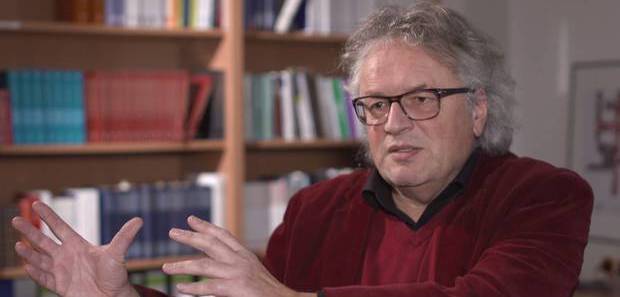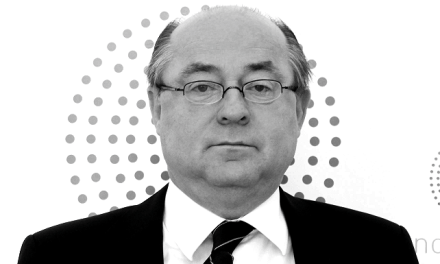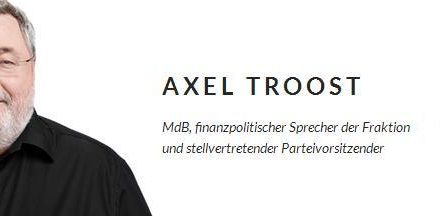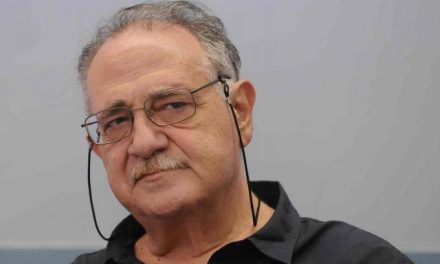Klaus Dörre is Professor of Sociology at the Friedrich-Schiller-University of Jena (Germany) where he chairs the Department of Labour, Industrial and Economic Sociology. His areas of research include the theory of capitalism, finance capitalism, flexible and precarious employment, labour relations and strategic unionism, and the Green New Deal, among others. He is the current director of the German Research Foundation research group Post-Growth Societies.
In Rosa Luxemburg Foundation’s booklet The “German Job Miracle” – a Model for Europe? (2014) Klaus Dörre described the “German model” as a social model of full but precarious employment, in which people in insecure jobs and the socially excluded pay the price for an export model that is exacerbating inequalities in Europe and so destroying the foundations of its own success. In his contribution to RLF publication “Europe – What’s left? Working on the strategies” (“The Limits of Landnahme: Capitalism will not die by itself, but it can be overcome”), he shows how different theoretical approaches and practices of left policies could be combined in a process of co-operation and mutual strengthening of converging efforts in favour of a better social order.
Professor Dörre spoke to “Epohi” weekly newspaper (We have to devise new ways of conceiving progressive, socialist politics, interview with Dimitris Givissis, 17.2.2018):
The issue of “Europe” is the center of the public discussions. How do you judge the developments?
The European Union continues to find itself in a deep crisis. The faulty design of the Eurozone and the extreme imbalances caused by the German export model have become an obstacle to European integration. Originally intended as a response to neoliberal globalisation and a kind of guarantee against German dominance, the EU and EMU have long morphed into a deregulation machine. This affects the Southern European countries the most. Forced into a new type of debt servitude as a result of the European banking and financial crisis, they are now compelled to enact disastrous austerity policies, the outcome of which is devastating. The austerity diktat counteracts the European Central Bank’s policy of low interest rates. Cheap money cannot enter the circuits of production and stimulate urgently needed investments because demand, including productive public consumption, is hampered by the imposed austerity while redistributive mechanisms – from tax policies to collective bargaining policies and collective security systems – have ceased to function. The economy inside the Eurozone is therefore growing highly unequally and at a low rate, while neither wages nor inflation are rising accordingly. The expansion of precarious employment conditions and the weakening of trade union organisational power act like a lead weight on wages, dragging down the wage ratio. The combination of these factors is now having an effect on the core European economies, particularly Germany. Germany needs the EU in order to maintain its export model. Yet due to the imposed austerity, the German government has aggravated processes of erosion which ultimately threaten the continued existence not only of the euro, but of the entire EU. That is why even German elites have come to realise that the EU and the Eurozone are in urgent need of structural reform.
What do you expect from the new German government? Do you think there is any chance for Germany to exceed itself and change its politics in the direction of a more flexible encounter of its European partners?
That remains unclear, at least for the time being. Should the grand coalition actually materialise, there will likely be a commitment to reforms and a readiness to increase the German contribution to the EU’s budget. That said, I doubt that the German government will really agree to far-reaching reforms as proposed by French president Macron. The resistance against such measures within the Christian Democratic parties, particularly in the (Bavarian) CSU, is too great. Likewise, the SPD has not yet come up with any new European policy. All the parties involved in the anticipated coalition government have supported austerity in the past. In light of all this, I am highly sceptical that any of these parties will have the strength to actually implement a fundamental course correction. Given enough pressure from France and the countries most affected by the crisis, however, the scope of political action for Greece and other Southern European countries may indeed increase. The example of Portugal, with its minority government tolerated by the parliamentary Left, shows that minor adjustments to austerity are both rational and possible.
How do you interpret the fact that SPD takes part in the new German government, in spite of what Martin Schulz had said right after the elections? Which factors contributed to this development?
The SPD is in a deep crisis. Beginning with the ‘Agenda 2010’ and the introduction of the ‘Hartz reforms’, the party has steadily shed its traditional political profile. The price for its electoral victories has been the abandonment of its political identity. But what goes around comes around: the SPD has lost a substantial part of its erstwhile working-class base of support. The share of workers among voters with a preference for the SPD receded from 44 percent to 17 percent between 2000 and 2016. It must be added, however, that the working-class proportion of the entire electorate decreased during the same period. The fact remains, then, that the erstwhile workers’ party SPD enjoys below-average representation among working-class milieus today. With regard to the shares of both unskilled workers (24 percent) and trade union members (19 percent), the SPD ranks noticeably behind the right-populist AfD (Alternative für Deutschland – ‘Alternative for Germany’) (36 percent unskilled workers, 24 percent trade union members) as well as the Left Party (23 percent unskilled workers, 27 percent trade union members). While the supporters of the Christian Democrats and Social Democrats come from nearly identical social backgrounds these days, the Left Party and AfD managed to distinguish themselves among working-class milieus. Compared to all other parties, the AfD received the largest share of votes among workers as well as unskilled wage earners. Actual electoral behaviour indeed conforms to this pattern. The AfD regularly emerged as the strongest party among workers and unemployed in various regional elections over the course of 2016. Alongside the migration issue, social justice was indicated as a prime electoral motivation by the party’s voters. This trend continued in Germany’s September 2017 national elections, albeit to a somewhat lesser extent; 12.6 percent of all voters – but 15 percent of trade union members (14 percent in the West, 22 percent in the East) and almost 20 percent of workers – voted for the populist Right.Unfortunately, Social Democracy’s de-proletarianisation and the abandonment of its traditional platform cannot be easily reversed. The party is in free fall in recent polls, with figures below 20 percent – a development which threatens its existence as such. As long as the party remains in a coalition government with the Christian Democrats, any meaningful policy change is impossible. When Martin Schulz became the new party leader, many hoped for a German Corbyn or Sanders. What they got instead was a bearer of hope without any political substance. At the moment, an improvement of the situation inside the SPD is not in sight. A quarrelling party leadership primarily interested in holding onto power is about to lose its last bit of credibility, thereby putting the future of Social Democracy as a whole at risk.
Given that SPD’s participation in the new German government has caused reactions in a big part of its electoral base, how do you see the prospectives of Die Linke inside the new political scenery that is being formed?
The Left Party would stand a good chance, if only it demonstrated more unity in central political questions – which, however, is currently not the case. With regard to important issues like the euro, the future of the European Union or how to deal with forced migration, the party is at odds. The Left Party has also lost working-class voters – especially in the East, where it lost several hundred thousand votes to the AfD. At the same time, its support among urban left-alternative milieus is growing. Nevertheless, the party is currently unable to translate dissatisfaction with the governing parties into support for an alternative left-wing politics. Internally, this has led to explosive controversies. Oskar Lafontaine and Sarah Wagenknecht consider the party project a failure and advocate for a new broad left movement, while party leaders Katja Kipping and Bernd Riexinger oppose this suggestion. In my view, the idea of a new broad left movement is not wrong in principle, but it lacks a corresponding programme, leadership figures and above all the social movements which such a project could actually base itself on. The greatest danger today is that the Left could become divided and disintegrate into even smaller groups, all of which would then have to fear falling below the 5-percent threshold required to enter parliament. That would truly be a disaster, for the only opposition would then come from the far right.
What does it mean for the political system of Germany that AfD will be from now on the biggest party of the opposition? What kind of dangers do you see?
Jürgen Habermas has spoken of a new breeding ground for fascism, and he is right. There really is a national-socialist danger in Germany. Through the Pegida movement and its offshoots, the far right has become a factor on the street. Moreover, the AfD now holds a considerable number of parliamentary mandates at the national level. Having started out as a radical free-market formation, the AfD is increasingly becoming a völkisch, or ethno-nationalist, social-populist party. Correspondingly, leading figures of the party like Björn Höcke declare that the ‘social question today’ does ‘not primarily’ consist of the ‘distribution of national wealth from the top to the bottom’, but ‘the new German social question of the 21st century’ is a ‘question of distributing national wealth inside instead of outside the country’. Simultaneously, they advocate for a tough border regime of ‘zero migration’. While the liberal-conservative current within the AfD is calling for a ‘national capitalism’ in the sense of reconciliation between small- and medium-sized business and labour, the national-social wing is keen to appropriate the labour movement’s 150-year-old legacy. The latter current accuses the German trade union confederation’s membership organisations of incredulously practicing an ‘oppositional relationship with employers’ because they resemble ‘state-run unions’ and are part of the establishment. This strategy is actually working, and neither the Left nor the trade unions have been able to formulate an adequate response thus far. Along with the AfD’s success, the boundary of socially acceptable discourse is clearly shifting to the right. Adding together the parliamentary mandates of the CDU/CSU, FDP and AfD, Germany has a structural right-wing majority of more than 60 percent. A left project is currently unable to win a majority. To be honest about this fact would be a first step. We have to devise new ways of conceiving progressive, socialist politics – not only in Germany, but all over Europe.
Read more via Greek News Agenda: Collective Labour Agreements: Regaining the lost ground
Watch Professor Klaus Dörre speaking at Rosa Luxemburg Foundation conference on the 100 years since the first Berlin edition of “The Accumulation of Capital: A Contribution to an Economic Explanation of Imperialism” (March 2014):
N.N.














